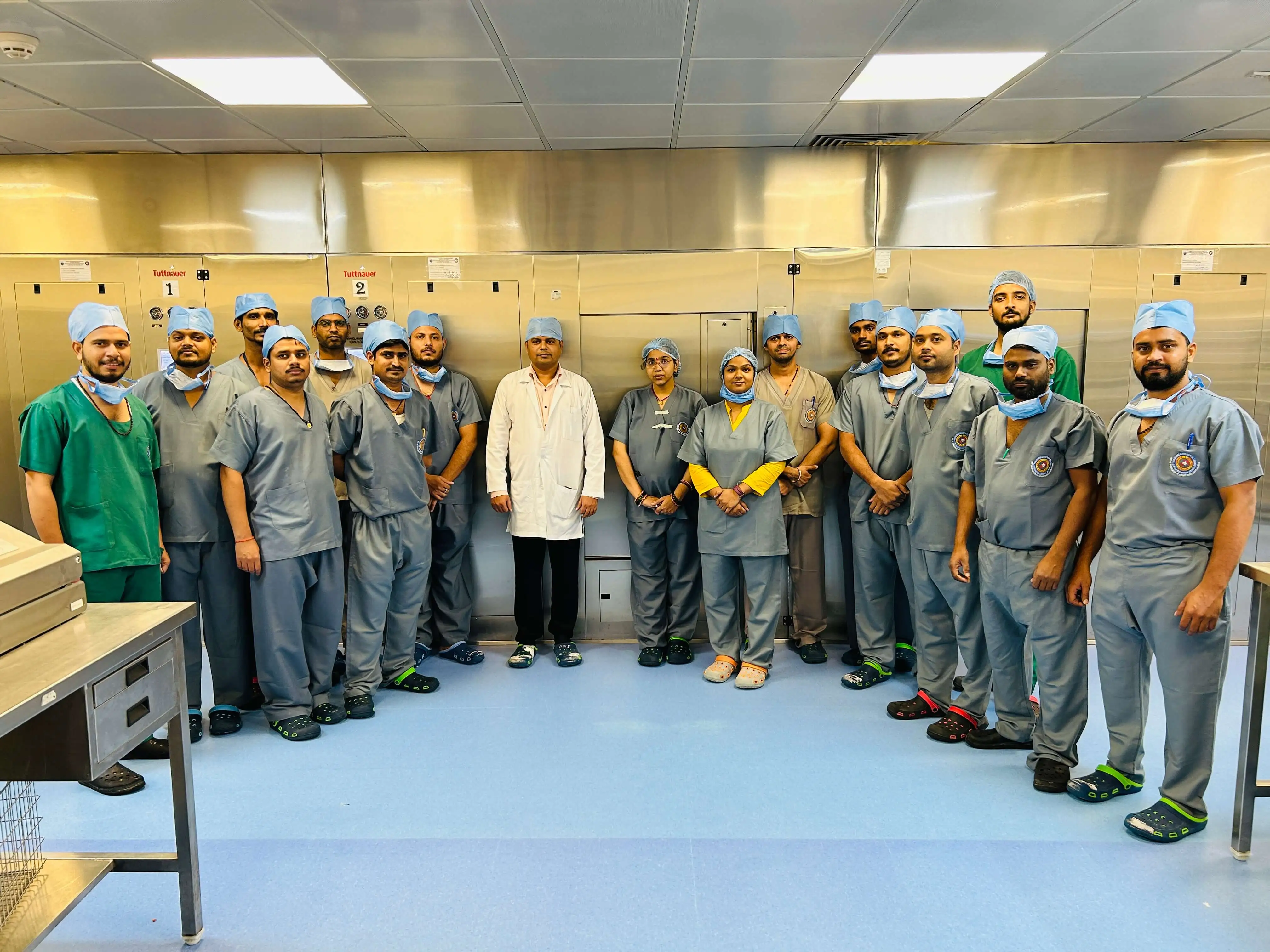
Contact Info
- Call: +91-0542-6917700 Ext: 3333/3335.
- cssd@mpmmcc.tmc.gov.in
- RT Building 3rd Floor
Working Hours
- Monday - Friday 9:00 AM - 5:00 PM
- Saturday 9:00 AM - 2:00 PM
- Sunday Weekoff
Central Sterile Supply Department (CSSD)
About
Every year, hundreds of millions of patients are affected by a healthcare associated infection (HCAI, HAI or nosocomial infection) worldwide form a serious threat to people’s health. Central Sterile Supply Department (CSSD) has a significant role to play to abort the ‘chain of transmission’ of Hospital associated infection across various patient care areas in the hospital. Clean and infection free material inspires confidence amongst the patients and front-line workers and enhances their satisfaction level.Medical technology is rapidly advancing. The Medical devices used in Operating Room and throughout healthcare facility have changed dramatically over the years. As these devices become more complex, the CSSD will be required to keep up with advances to reprocess them. Many instruments and materials used for medical and surgical purpose are very expensive and are designed such that they can be re-used. Central Sterile supplies continue to be a major support area in the hospital.Major responsibilities of CSSD includes cleaning, processing and sterilization of surgical instruments, treatment trays and sets, dressings material, Linen and rubber goods (tubing) etc. It is also responsible for economic and effective utilization of equipment resources of the hospital under controlled supervision. CSSD maintains standardize procedures for sterilization of different articles used in the hospital to ensure high sterility level.
Sterilization is a term referring to a process that eliminates (removes) or kills all forms of microbial life including spores, by applying the proper combinations of heat, chemicals, irradiation, high pressure, and filtration. This aim is to provide all the departments with possible specified and limited exception, adequate supply of reliably sterilized materials immediately and constantly available for routine and emergency use, from a sterile supplies department where bacteriological safe sterilization is conducted under controlled condition and at minimum possible costs. Thus, contributing towards reduction in the incidence of hospital cross infection. The Hospital is committed to ensuring highest standard of sterilization of Equipment’s, instruments and other articles so as to ensure maximum infection control possible.
To facilitate one-way flow of materials from the soiled area to the clean processing area and on to the sterile storage area, our CSSD is mainly divided into three major areas.
- Decontamination area.
- Preparation and packing area.
- Sterile storage and distribution area.
Decontamination Area:
The Decontamination area where all soiled instruments and other items are received from user departments. Decontamination is the physical or chemical process that involves a thorough cleaning process with the help of multienzymes solution that may be accomplished with manual and/or mechanical cleaning. All items return to this area are considered contaminated and potentially infectious.
Designated staff working in this area must wear special attire called personal protective equipment (PPE), which minimizes exposure to bloodborne pathogens and other contaminants.
Equipment’s Used In Decontamination Area:
- Air Jet Gun – 01.
- Water jet gun – 01.
- Different sizes of brushes – various sizes brushes for manual cleaning.
- Ultrasonic cleaner – 01.
- Washer Disinfector-02.
- R/O plant and water Chiller plant.
- Soiled Dumbwaiter- To transport soiled instruments directly from Operating Room to CSSD.
Preparation & Packing Area:
After decontamination, items are safe for handling, they are delivered to Preparation and packaging area. Each item carefully inspected for cleanliness, proper function and possible defects. Instruments and other devices are appropriately assembled, arranged as per sets checklist and packed in appropriate packing material and labeled in preparation for sterilization.
Sterilization of material is carried out by steam, EO and H2O2 gas plasma, as per manufacture’s recommendation.Physical, Chemical and Biological indicators are used appropriately to maintained high quality standards, and records of the same maintained.
Equipment’s Used In Preparation & Packing Zone:
- HPHV Steam Sterilizers (High Temperature) - 04
- H2O2 Gas Plasma/Vapor Sterilizer (Low Temperature)- 02
- ETO (Ethylene Oxide) Sterilizer (Low Temperature) - 01
- Sealer Machine- 04
Sterile Storage & Distribution Area:
The major portion of work in this area involves receiving sterile material from sterilizer, storing and dispensing supplies and sterile instruments to user department.Unloading sterilizer cart after successful completion of sterilization cycle and after proper verification of all quality indicators.
Environment is maintained to store the sterile articles, i.e. positive air pressure, Temperature 18°c to 24°c with relative humidity less than 70%. Material is stored on dedicated racks and baskets. Distribution of sterile material is done by dispatched window and dumb waiter. Environmental Surveillance of Sterile Area for microbial growth is done on regular interval.
Achievements:
- “In April 2022, the Central Sterile Supply Department (CSSD) of MPMMCC secured the First Place under the Government Healthcare Organization Category in an external audit conducted by CAHO (Consortium of Accredited Healthcare Organizations) under the ACE (Awareness – Compliance – Excellence) program for CSSD. The award was received by CSSD In-Charge, Mr. Rajesh Phulare, and his team.
- Continuing this tradition of excellence, in April 2025, the CSSD of MPMMCC once again secured the First Place under the Government Healthcare Organization Category (North Zone) in an external audit conducted by CAHO, reaffirming its commitment to the highest standards of sterilization, infection prevention, and patient safety.
- Further, in October 2024, the CSSD of MPMMCC received the prestigious Patient Safety Award at the Healthcare Sector Skill Council’s National NextGen CSSD Leaders Annual Meet 2024. This recognition highlights the department’s dedication to enhancing patient safety standards and continuous quality improvement within the healthcare sector.”
Staff Members:
▼Copyright © 2026 HBCH & MPMMCC, Varanasi Last Updated on : 1-March-2026